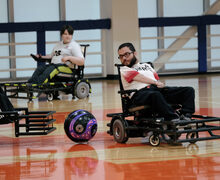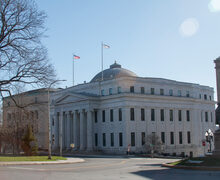This is what black student leadership looked like in 1968
Daily Orange File Photo
Charles Hicks hails originally from Bogalusa, Louisiana. His father, Bob, was an outspoken civil rights activist in their hometown.
Editor’s note: In light of Black History Month, this story and “This is what black student leadership looks like in 2017” examine black student leadership in the 1960s and today.
Charles Hicks was elected the first black president of the Syracuse University Student Government, now known as the Student Association, in 1968. He earned that title after a campaign season interrupted by the assassination of Martin Luther King Jr., in what many historians call the most turbulent year in United States’ history.
Although this historic time period marked a climax for the Civil Rights Movement, it was only years before that Hicks’ family was at a crucial intersection of white suppression and black resistance.

Daily Orange File Photo
In 1965, the Hicks family was hosting two young white women who were Civil Rights activists in their home. The Ku Klux Klan planned to bomb the house in response to the Hicks’ harboring them, but also because Hicks’s father, Bob, was a prominent civil rights leader in their hometown of Bogalusa, Louisiana.
Hicks remarked in an oral history interview with the Smithsonian National Institute that his father always made time for his family, something he believes many young black men lack.
“Sometimes I think about how lucky we were,” he said. “Not only was he (a father) for me, but for so many people in that community.”
Bob created a chapter of the Deacons in Bogalusa, a civil rights protesting body that favored a more militant approach than King Jr.’s well known non-violent efforts.
But in the end, everyone was safe. The Hicks’ swiftly sent the girls to safety.

Daily Orange File Photo
Hicks graduated from SU in 1969 and returned to earn his master’s degree. In the 1968 student body presidential race, he ran against Joe Nicoletti.
Before his campaign for Student Government President, Hicks was heavily involved on campus. He served as the vice chairman and chairman of University Union, which brought The Temptations — famous for their song “My Girl” — to campus under his tenure.
The Student Government loosely resembled today’s SA governing body. Back then, students wishing to hold office ran with a political party or as an independent. They operated with a full campaign team, mirroring current elections at SU.
Hicks originally intended to run as an independent candidate. But when the Greek Independent Alliance party announced Matt Silverman as its only nominee — Silverman was the only person to have nominated himself by the specified deadline — members of the GIA decided to forego the deadline and extend a spot to Hicks.

Daily Orange File Photo
Silverman then dropped his presidential bid, securing Hicks as the presidential nominee for the GIA. The Daily Orange quoted Silverman in 1968, who instead picked up a nomination for Student Government treasurer.
“Chuck Hicks is our man. I give all my support to him,” he said.
As Hicks secured the GIA nomination, the Campus Alliance Party was securing its own nomination. Some of Hick’s fraternity brothers were also members of the CAP, and when Hicks announced he would run with the GIA, The Daily Orange printed that “the Campus Alliance Party almost lost its middle name.”
Those brothers announced they would support Hicks for SG president, and CAP scrambled to find a replacement, eventually nominating Nicoletti.

Daily Orange File Photo
The two candidates began campaigning on April 5, 1968, each advocating for a closer relationship between student government bodies and administration.
Hicks was primarily concerned with administrative handling of a marijuana bust, use of tear gas to break up a fight on University Place and introduction of a student discount card for local retail stores.
When King was assassinated, the university not only canceled classes but also postponed Student Government campaigning for a week. Both Hicks and Nicoletti violated that stipulation, however, and had to pay a $40 fine each.
Campaigns pressed on, and Hicks marched into campus residence halls with his team, quoting from The Beatles’ song “a little help from our friends” as a campaign slogan.


Daily Orange File Photos
The week before the election, Hicks and his crew spent six hours visiting residence halls, speaking on campaign issues and publishing ads like the one seen above in The Daily Orange.
The late ‘60s were a formative time for student life at SU. There were rumblings of then-Chancellor William Tolley acting as Student Government president, which Hicks urged was a mistake. In Hicks’ last address before the election, The Daily Orange reported that he said, “I’m trying to show you, the student, why you need student government.”
After election day on April 19, Hicks was carried into his victory celebration sitting on his friends’ shoulders after securing the presidency by a 600-vote margin.
Published on January 31, 2017 at 10:50 pm
Contact: cmrussel@syr.edu | @caseymrussell




